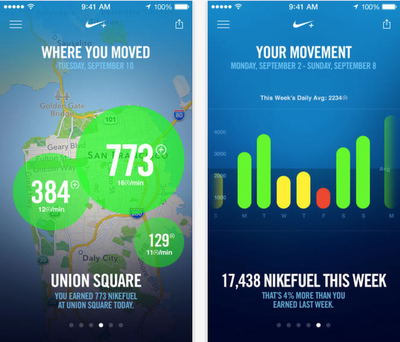Nike+ Move, First Introduced M7 Coprocessor-Integrated App, Launches in App Store
First announced at Apple's September 10 media event alongside the iPhone 5s and its M7 motion coprocessor, the Nike+ Move app has launched in the App Store, allowing iPhone 5s users to get enhanced statistics daily about their physical activity.
The new app was the first introduced to take advantage of the M7 coprocessor and new CoreMotion APIs in iOS 7, allowing it to track more reliable and accurate movement data in the background, even when the phone is asleep, while also conserving battery life. The app then takes all the movement data it gathers and converts it into NikeFuel, the fitness company's measuring unit for physical activities, and uses it to motivate a user to keep exercising.

Nike+ Move offers insight into when you move, how you move and where you move - and lets you challenge your friends to see who moves more.
-Win the day by beating your NikeFuel average and watch your goal ring change from Red to Green.
- See when you are most active throughout the day and how you’re doing compared to yesterday.
- Move more often and win as many hours as you can throughout the day.
- See how you moved through the day with a breakdown of running, walking, and other movement.
- See where you're moving and where you move the most each day.
- Check out how you compare against your Game Center friends or other Nike+ Move users near you.
While Nike+ Move isn't the first app to integrate the M7 coprocessor, it is the highest profile app to take advantage of the new processor onboard the iPhone 5s. Apple is planning to take advantage of the M7 in future software updates by leveraging it to improve iPhones' mapping and location services.
Nike+ Move is available only for the iPhone 5s in the App Store for free. [Direct Link]
Popular Stories
The long wait for an Apple Watch Ultra 3 appears to be nearly over, and it is rumored to feature both satellite connectivity and 5G support.
Apple Watch Ultra's existing Night Mode
In his latest Power On newsletter, Bloomberg's Mark Gurman said that the Apple Watch Ultra 3 is on track to launch this year with "significant" new features, including satellite connectivity, which would let you...
Apple's next-generation iPhone 17 Pro and iPhone 17 Pro Max are just over two months away, and there are plenty of rumors about the devices.
Below, we recap key changes rumored for the iPhone 17 Pro models.
Latest Rumors
These rumors surfaced in June and July:Apple logo repositioned: Apple's logo may have a lower position on the back of the iPhone 17 Pro models, compared to previous...
The iPhone 17 Pro Max will feature the biggest ever battery in an iPhone, according to the Weibo leaker known as "Instant Digital."
In a new post, the leaker listed the battery capacities of the iPhone 11 Pro Max through to the iPhone 16 Pro Max, and added that the iPhone 17 Pro Max will feature a battery capacity of 5,000mAh:
iPhone 11 Pro Max: 3,969mAh
iPhone 12 Pro Max: 3,687mAh...
Apple's position as the dominant force in the global true wireless stereo (TWS) earbud market is expected to continue through 2025, according to Counterpoint Research.
The forecast outlines a 3% year-over-year increase in global TWS unit shipments for 2025, signaling a transition from rapid growth to a more mature phase for the category. While Apple is set to remain the leading brand by...
AppleInsider's Marko Zivkovic today shared a list of alleged identifiers for future Mac models, which should roll out over the next year or so.
The report does not reveal anything too surprising, but it does serve as further evidence that Apple is seemingly working on new models of every Mac, including the MacBook Air, MacBook Pro, iMac, Mac mini, Mac Studio, and Mac Pro.
Apple is...
The upcoming iPhone 17 Pro and iPhone 17 Pro Max are rumored to have a slightly different MagSafe magnet layout compared to existing iPhone models, and a leaked photo has offered a closer look at the supposed new design.
The leaker Majin Bu today shared a photo of alleged MagSafe magnet arrays for third-party iPhone 17 Pro cases. On existing iPhone models with MagSafe, the magnets form a...


















